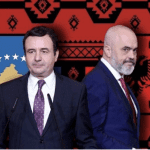By Janusz Bugajski
Foreign policy has become a vital issue in American politics as candidates begin to line up for the 2008 presidential elections. With the death toll mounting among U.S. troops in Iraq, public support for military engagement is rapidly falling and President Bush’s approval ratings have plummeted.
The Iraqi imbroglio has highlighted three basic problems in Washington’s strategy in the Middle East. First, America evidently cannot handle insurgencies. Over thirty years ago, the Vietnam war demonstrated that in the full glare of the world media, a democratic state cannot compete with an unaccountable enemy that murders civilians as an essential part of its strategy and where every massacre is presented as an American defeat.
Insurgencies become even more difficult to combat where the indigenous government is weak and where foreign recruits are mobilized and supported by neighboring states. In the middle of such a conflict, it is difficult to win people’s “hearts and minds” as Vietnam proved.
Second, America cannot handle civil wars except when they are exhausted, as was the case in Bosnia-Hercegovina. In Iraq, the insurgency has deliberately provoked sectarian and inter-communal violence that is steadily escalating into a full-scale civil war in which the government exerts little authority and the Iraqi security forces exercise little control.
Third, many critics of White House policy contend that the U.S. or any other power cannot implant durable democracies in unsuitable political environments. This is especially problematic when the American military is widely seen as an occupying force without which the fragile administration in Baghdad would rapidly collapse.
The Middle East is not post-communist Eastern Europe where democratic traditions have some history and where the citizenry hold clear aspirations to “rejoin the West.” Moreover, each European country was given the prospect of assimilating with the EU and NATO if it fulfilled certain conditions, with the promise of long-term stability and prosperity. Such pledges have not been offered to any Middle Eastern state.
Although no country is fully immune from democracy, Arab societies are traditionally based on the principles of patriarchy, hierarchy, and authoritarianism. Moreover, religious authorities have assumed the role of national leaders, especially in the Shiite community, and demand blind obedience to religious edicts and the rejection of “Western liberalism.” In the middle of a violent insurgency in a country on the verge of civil war and challenged by religious dogmatics and a secessionist movement among the Kurds, the implanting of democracy seems a utopian proposition.
Although it is easy to criticize President Bush over his Iraq policy, thus far no one has detailed any credible and workable alternative. Democrats and Republicans remain internally divided as to solutions and timetables for troop withdrawal. Some want a quick exit; others seek a longer-term phased pullout, while others still even advise an injection of more U.S. forces in the hope of crushing the various rebellions.
Clearly, no strategy can bring instant success or even a durable victory. A fast military departure could precipitate even greater chaos and ungovernability culminating in the collapse and potential partition of the Iraqi state. A slow pullout will result in escalating U.S. casualties and even greater public opposition at home. In both scenarios U.S. credibility will be severely damaged around the world.
At the same time, other foreign policy challenges are growing. The success of the NATO mission in an increasingly unstable Afghanistan cannot be guaranteed. Iran and North Korea are rapidly developing nuclear capabilities and challenging regional stability. The upcoming U.S. presidential elections will also focus on the question whether the invasion of Iraq, designed to combat terrorism, actually created the conditions for expanding the terrorist threat by increasing anti-Americanism and bringing new recruits for the jihadists.
There are no easy solutions to growing foreign policy threats but the next U.S. President must find a way to convince American voters and America’s allies that he has the right answers.
The Future of U.S Foreign Policy

Change font size:









